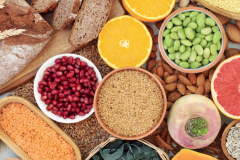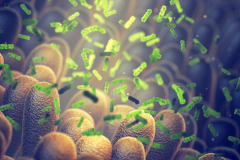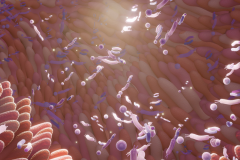- Overview
-
Canada has amongst the highest rates of immune-mediated diseases, including inflammatory bowel disease, in the world. The vast majority of these diseases have no known cure. Therefore, new therapeutic strategies that improve clinical outcomes in these patient groups are urgently needed. Additionally, there are large differences between patients in response to various medical and dietary therapies, which challenges a ‘one-size-fits all’ approach to clinical care.
My research focuses on expanding our knowledge of host-immune-microbe interactions, with a specific focus on identifying host (i.e., diet) and microbial factors involved in different responses to medical and dietary therapies. By better understanding individualized response to treatments, we can move towards developing and using personalized therapeutic programs to improve patient outcomes.
We use various digital health technologies and ‘multi-omics’ techniques (i.e., metagenomics, metabolomics, metaproteomics) to explore the role that dietary intakes and the microbes residing in the gastrointestinal tract play in changing the response to therapy.
- Publications
-
A mouse model for the study of diet-induced changes in intestinal microbiome composition on renal calcium oxalate crystal formation
Urolithiasis
Hanstock, S. and Ferreira, D. and Adomat, H. and Eltit, F. and Wang, Q. and Othman, D. and Nelson, B. and Chew, B. and Miller, A. and Lunken, G. and Lange, D.
DOI: 10.1007/s00240-024-01672-2
2025Gut microbiome predictors of advanced therapy response in Crohn's disease: protocol for the OPTIMIST prospective, longitudinal, observational pilot study in Canada
BMJ Open
Massaro, C.A. and Meade, S. and Lemari{\'e}, F.L. and Kaur, G. and Bressler, B. and Rosenfeld, G. and Leung, Y. and Williams, A.-J. and Lunken, G.
DOI: 10.1136/bmjopen-2024-094280
2025Insights Into Inflammatory Bowel Disease and Effects of Dietary Fatty Acid Intake With a Focus on Polyunsaturated Fatty Acids Using Preclinical Models
Journal of the Canadian Association of Gastroenterology
Smyth, M. and Lunken, G. and Jacobson, K.
DOI: 10.1093/jcag/gwad058
2024Effect of diet on the gut mycobiome and potential implications in inflammatory bowel disease
Gut Microbes
Buttar, J. and Kon, E. and Lee, A. and Kaur, G. and Lunken, G.
DOI: 10.1080/19490976.2024.2399360
2024Design and reporting of prebiotic and probiotic clinical trials in the context of diet and the gut microbiome
Nature Microbiology
Whelan, K. and Alexander, M. and Gaiani, C. and Lunken, G. and Holmes, A. and Staudacher, H.M. and Theis, S. and Marco, M.L.
DOI: 10.1038/s41564-024-01831-6
2024Utilizing the gut microbiome as a biomarker of response to dietary interventions in inflammatory bowel disease: moving toward precision nutrition
American Journal of Clinical Nutrition
Lunken, G.R.
DOI: 10.1016/j.ajcnut.2024.01.022
2024Dysregulated Immunity to Clostridioides difficile in IBD Patients Without a History of Recognized Infection
Inflammatory Bowel Diseases
Cook, L. and Wong, M.Q. and Rees, W.D. and Schick, A. and Lisko, D.J. and Lunken, G.R. and Wang, X. and Peters, H. and Oliveira, L. and Lau, T. and Mah, R. and Bressler, B. and Levings, M.K. and Steiner, T.S.
DOI: 10.1093/ibd/izad238
2024Highly Sensitive, Flow Cytometry-Based Measurement of Intestinal Permeability in Models of Experimental Colitis
Cellular and Molecular Gastroenterology and Hepatology
Tsai, K. and Ma, C. and Han, X. and Allaire, J. and Healey, G.R. and Crowley, S.M. and Yu, H. and Jacobson, K. and Xia, L. and Priatel, J.J. and Vallance, B.A.
DOI: 10.1016/j.jcmgh.2022.10.004
2023User testing to modify the MyHealthyGut digital health application for inflammatory bowel disease
Digital Health
Erlich, M. and Lindblad, S. and Haskey, N. and Clarkin, D.H. and Dong, T. and Harvie, R. and Lunken, G. and Pirnack, J. and Jacobson, K.
DOI: 10.1177/20552076231203664
2023Gut microbiome-associated predictors as biomarkers of response to advanced therapies in inflammatory bowel disease: a systematic review
Gut Microbes
Meade, S. and Liu Chen Kiow, J. and Massaro, C. and Kaur, G. and Squirell, E. and Bressler, B. and Lunken, G.
DOI: 10.1080/19490976.2023.2287073
2023Curated and harmonized gut microbiome 16S rRNA amplicon data from dietary fiber intervention studies in humans
Scientific Data
Rodriguez, C.I. and Keshavarzian, A. and Hamaker, B.R. and Liu, F. and Lunken, G.R. and Rasmussen, H. and Zhou, H. and Tap, J. and Swanson, K.S. and Ukhanova, M. and Leclerc, M. and Gotteland, M. and Navarrete, P. and Kovatcheva-Datchary, P. and Dahl, W.J. and Martiny, J.B.H.
DOI: 10.1038/s41597-023-02254-4
2023User testing to inform modification of the MyHealthyGut digital health application in inflammatory bowel disease
medRxiv
Erlich, M. and Lindblad, S. and Haskey, N. and Clarkin, D.H. and Dong, T. and Harvie, R. and Lunken, G. and Pirnack, J. and Jacobson, K.
DOI: 10.1101/2023.03.23.23287648
2023Correction: Genomic insights from Monoglobus pectinilyticus: a pectin-degrading specialist bacterium in the human colon (The ISME Journal, (2019), 13, 6, (1437-1456), 10.1038/s41396-019-0363-6)
ISME Journal
Kim, C.C. and Lunken, G.R. and Kelly, W.J. and Patchett, M.L. and Jordens, Z. and Tannock, G.W. and Sims, I.M. and Bell, T.J. and Hedderley, D. and Henrissat, B. and Rosendale, D.I.
DOI: 10.1038/s41396-023-01419-8
2023Variability in mRNA SARS-CoV-2 BNT162b2 vaccine immunogenicity is associated with differences in the gut microbiome and habitual dietary fibre intake
Genelle R. Healey and Liam Golding and Alana Schick and Abdelilah Majdoubi and Pascal M. Lavoie and Bruce A. Vallance
DOI: 10.1101/2022.08.24.22279143
08/2022Gut microbiome and dietary fibre intake strongly associate with IgG function and maturation following SARS-CoV-2 mRNA vaccination
Gut
Lunken, G.R. and Golding, L. and Schick, A. and Majdoubi, A. and Lavoie, P.M. and Vallance, B.A.
DOI: 10.1136/gutjnl-2022-328556
2022AN INULIN-TYPE FRUCTAN ENRICHED EXCLUSIVE ENTERAL NUTRITION FORMULA SUPPRESSES COLITIS THROUGH GUT MICROBIOME MODULATION AND PROMOTING EXPANSION OF ANTI-INFLAMMATORY T CELL SUBSETS
Genelle R. Healey and Kevin Tsai and Daniel J. Lisko and Laura Cook and Bruce A. Vallance and Kevan Jacobson
DOI: 10.1101/2021.02.02.429403
02/2021Therapeutic advances in gut microbiome modulation in patients with inflammatory bowel disease from pediatrics to adulthood
International Journal of Molecular Sciences
Eindor-Abarbanel, A. and Healey, G.R. and Jacobson, K.
DOI: 10.3390/ijms222212506
2021An inulin-type fructan enriched exclusive enteral nutrition formula modulates the gut microbiome and promotes expansion of anti-inflammatory T cell subsets to suppress colitis
Cellular and Molecular Gastroenterology and Hepatology
2021Prebiotic Enriched Exclusive Enteral Nutrition Suppresses Colitis via Gut Microbiome Modulation and Expansion of Anti-inflammatory T Cells in a Mouse Model of Colitis
Cellular and Molecular Gastroenterology and Hepatology
Healey, G.R. and Tsai, K. and Schick, A. and Lisko, D.J. and Cook, L. and Vallance, B.A. and Jacobson, K.
DOI: 10.1016/j.jcmgh.2021.06.011
2021Fiber and Prebiotic Interventions in Pediatric Inflammatory Bowel Disease: What Role Does the Gut Microbiome Play?
Nutrients
Genelle R. Healey and Larissa S. Celiberto and Soo Min Lee and Kevan Jacobson
DOI: 10.3390/nu12103204
10/2020Genomic insights from Monoglobus pectinilyticus: a pectin-degrading specialist bacterium in the human colon
ISME
DOI: 10.1038/s41396-019-0363-6
02/2019Habitual dietary fibre intake influences gut microbiota response to an inulin-type fructan prebiotic: a randomised, double-blind, placebo-controlled, cross-over, human intervention study
British Journal of Nutrition
Genelle Healey and Rinki Murphy and Christine Butts and Louise Brough and Kevin Whelan and Jane Coad
DOI: 10.1017/S0007114517003440
01/2018Inflammatory bowel disease and immunonutrition: novel therapeutic approaches through modulation of diet and the gut microbiome
Immunology
Celiberto, L.S. and Graef, F.A. and Healey, G.R. and Bosman, E.S. and Jacobson, K. and Sly, L.M. and Vallance, B.A.
DOI: 10.1111/imm.12939
2018Interindividual variability in gut microbiota and host response to dietary interventions
Nutrition Reviews
DOI: 10.1093/nutrit/nux062
2017Variability in gut microbiota response to an inulin-type fructan prebiotic within an in vitro three-stage continuous colonic model system
Bioactive Carbohydrates and Dietary Fibre
DOI: 10.1016/j.bcdf.2017.07.001
2017Influence of habitual dietary fibre intake on the responsiveness of the gut microbiota to a prebiotic: Protocol for a randomised, double-blind, placebo-controlled, cross-over, single-centre study
BMJ Open
Healey, G. and Brough, L. and Butts, C. and Murphy, R. and Whelan, K. and Coad, J.
DOI: 10.1136/bmjopen-2016-012504
2016Validity and reproducibility of a habitual dietary fibre intake short food frequency questionnaire
Nutrients
Healey, G. and Brough, L. and Murphy, R. and Hedderley, D. and Butts, C. and Coad, J.
DOI: 10.3390/nu8090558
2016The link between breast milk, infant faecal and maternal faecal microbiota.
Proceedings of the Nutrition Society of Australia
2015 - Research
-
The effect of dietary modulation on fungal and viral communities in the gastrointestinal tract
We plan to determine whether various dietary components, including food additives, dietary fibres, and polyphenolics, impact the composition and functional capacity of the virome (viruses) and mycobiome (fungi) in healthy individuals and inflammatory bowel disease (IBD) patients. Diet has a profound impact on the gut microbiome (collection of microorganisms in the gut), however, the vast majority of research to date only focuses on the modulating capacity of diet in the context of the gut bacteria. Additional research is therefore needed to elucidate the impact diet has on shaping the viral and fungal communities within the gut. This is particularly important as recent research has established that the virome and mycobiome are likely implicated in the development and management of immune-mediated conditions such as IBD.Therapeutic efficacy and gut microbiome modulating capacity of a fibre-enriched exclusive enteral nutrition strategy in pediatric Crohn’s disease
In this translational research project we aim to conduct a randomized controlled trial to determine whether enriching exclusive enteral nutrition (EEN) with fibre will prevent gut microbiome dysbiosis (imbalance) and enhance disease outcomes compared to a fibre-free EEN formula. Additionally, we will determine whether there is a gut microbiome signature, and/or specific dietary components associated with EEN response and/or sustained remission.GrantsWeston Family Microbiome Initative – “Effect of supplemented toddler diets on the gut microbiome and its association with neurodevelopmental outcomes” – $300,000 over 2 years – Co-investigator (2022-2024)
Weston Family Microbiome Initative – “Characterizing the gut microbiome in patients during COVID-19 infection” – $125,700 over 2 years – Co-investigator (2020-2022)
Weston Family Microbiome Initative – “Leveraging the gut microbiota in treatment refractory epilepsy” – $150,000 over 2 years – Co-investigator (2019-2021)
Honours & AwardsMichael Smith Health Research BC Trainee Award – 2018-2022
People’s Choice Best Poster Award – IMPACTT Canadian Microbiome Symposium – 2021
Best Presentation Award – Canadian Digestive Disease Week – 2021
Trainee Prize for Abstract Submission – Canadian Digestive Disease Week – 2021
Ministry of Business, Innovation and Employment PhD Scholarship – New Zealand Government – 2014-2017
Research Group MembersIsolde Angela Tan, Undergraduate Clinical Research Assistant
Simran Chahal, Clinical Research Trainee
Jaideep Grewal, INSPIRE PROGRAM TRAINEE
Katie Uyen Khanh Le, Volunteer
Fanny Lemarie, Clinical Trial Project Coordinator
Cristian Massaro, Masters student
Mackenzie Melvin, Research Technician
Gabriele Moreira Guimarães, Research Technician
Alexander Pei, Research Assistant
Shrushti Shah, Postdoctoral Fellow
James Sousa, PhD student
Jiawen Wang, PhD student
Mathilde Wilhelmy, Master's student
Caleb Stanley Yang, Volunteer
Congratulations CIHR Spring 2025 Project Grant recipients
Congratulations to the investigators and their teams who were awarded funding through the Canadian Institutes of Health Research (CIHR) Spring 2025 Project Grant competition.






